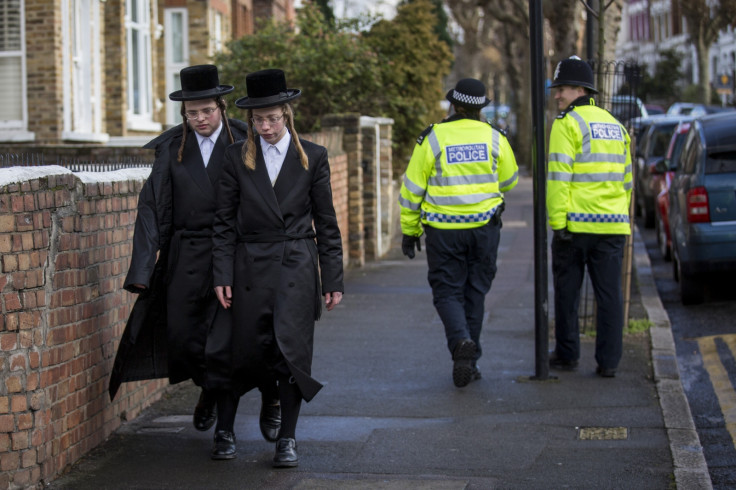The UK's anti-Semitism problem
Study by the Institute for Jewish Policy Research shows over a quarter of people still hold anti-Semitic views.
Four years ago, the European Union Agency for Fundamental Rights – the EU body that gathers data on discrimination and hate crime against minorities – published a report finding that almost three-quarters of Europe's Jews believed that anti-Semitism was rising, two-thirds regarded it as at least "a fairly big problem", and one in five had directly experienced anti-Semitic harassment or violence in the previous year.
The results for the UK were slightly lower than average, but not dissimilar. Yet in other studies, when attitudes of non-Jews towards Jews were measured, levels of anti-Semitism in the UK were found to be among the lowest in the world, affecting no more than about 5-10% of the population. How could it be that they were so low, when anxieties among Jews were so comparatively high?
To some extent, one answer at least is obvious. The spate of terrorist attacks against Jewish targets in recent years hasn't directly hit the UK Jewish community, but it has come close.
Four people were murdered in an attack on the Jewish Museum in Brussels in May 2014. Another four were murdered in a kosher supermarket in Paris in January 2015. A young Jewish volunteer security guard was murdered in Copenhagen while guarding the synagogue there in February 2015. In April of this year, an elderly Jewish woman was beaten to death in her own home in Paris before her body was hurled over a balcony into the street below.
The examples are mounting up, and British Jews are looking over their shoulders and asking the obvious question: could the same things happen here?
Yet the new report published recently by the Institute for Jewish Policy Research (JPR) and Community Security Trust (CST) offers an alternative, or at least complementary explanation. On the one hand, levels of anti-Semitism are indeed low in Great Britain. No more than 2.4% of the population can meaningfully be characterised as 'hardcore' anti-Semites – i.e. people who hold multiple hostile views about Jews and express them readily and confidently.
Yet 28% of the population of Great Britain agrees with at least one of the seven anti-Semitic value statements presented to them in the study, to some degree at least. Agreement with all seven of these statements – which include long-established anti-Semitic ideas about undue influence, divided loyalty, and ill-gotten wealth, as well as denial or trivialisation of the Holocaust – is vanishingly rare, but anti-Semitic ideas are found to live and breathe in different forms and at different levels of intensity across over a quarter of British society.
In most cases, the individuals captured within this quarter of society are emphatically not anti-Semitic, at least not ideologically so. Half of them only endorse one of the seven statements – and often tentatively at that – whilst rejecting all of the others. Clearly there is a distinction to be drawn between these individuals, and those who hold multiple such views and express them readily and confidently.

Yet the possibility exists that anyone within this quarter of society may, on occasion, express such a view, maybe in malice, but more likely in ignorance or thoughtlessness. And either way, if a Jewish person happens to be within earshot, it is more than conceivable that he or she will take offence, or at least feel wary, anxious, or uncomfortable.
A comparison can be drawn with attitudes towards women. The 2005 World Values Survey found that only about 3% to 4% of people in the UK strongly agreed with multiple value statements that denigrated women in various ways. Yet, 31% of people agreed with at least one such statement, to some extent at least.
The implication is that the proportion of ideologically-driven misogynists in British society is small, but the proportion of people who might make an occasional comment that demeans women and makes them feel uneasy, unsafe, or uncomfortable is considerably higher. Our words and our comments matter – however strongly or weakly our opinions are held – and they have a direct bearing on the quality of life of others.
Social media almost certainly exacerbates the problem. It puts all of us into contact with far more views than we would otherwise encounter, so the chances of coming across a disturbing or upsetting opinion is greater than it has ever been. Trying to make sense of what we hear and read – and the difficulties involved in determining whether any particular remark is being expressed in mere stupidity or in malevolence – is a key factor in what drives levels of anxiety.
As a general rule, the JPR/CST study confirms that levels of anti-Semitism in Great Britain are relatively low. Yet the tropes and canards that comprise anti-Semitism clearly continue to bubble away within a significant part of British society, as they have done for centuries, causing anxiety, hurt and concern.
Until that is comprehensively addressed, anti-Semitism will remain a problem.
Dr Jonathan Boyd is executive director of the Institute for Jewish Policy Research (JPR).
© Copyright IBTimes 2025. All rights reserved.




















